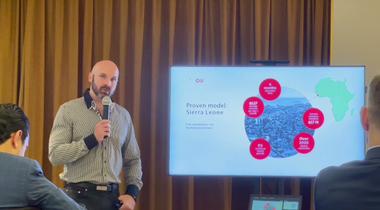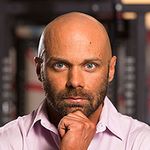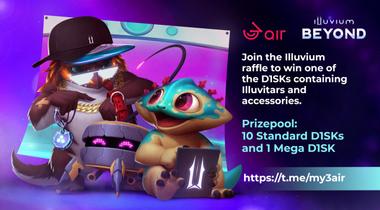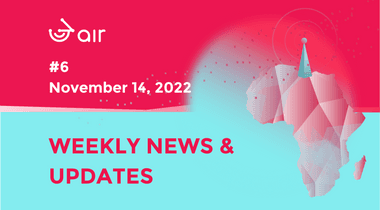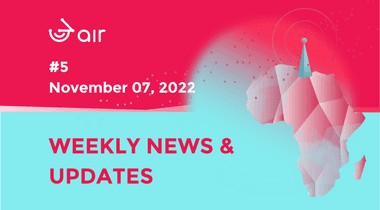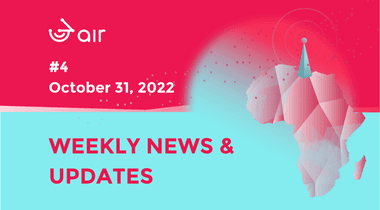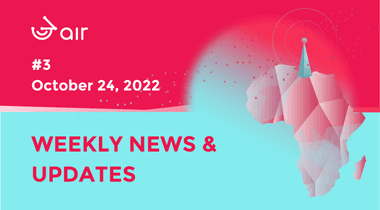This is a transcript from the presentation given by Sandi Bitenc for 3air on 24th of November 2021
Sandi Bitenc: 00:04
Okay, hello, everyone. I’m really happy to have the opportunity today to speak to you about our project. So let me introduce myself. So I’m in Sandi Bitenc and I’m the CEO of 3air. And our company is very much involved with Switzerland. And not only that we are a Platinum Partner of CV labs global. Everything actually started out of Switzerland, because K3 Telecom, that’s our main partner and everything is coming out of that. It’s actually a Swiss based company. I’ll try to explain you a bit how we are integrating blockchain in it.
00:52
But let me first speak to you a bit about the internet. So Oliver said to you that internet is kind of that we’re not even thinking about it when we’re using it. But not all people are like this. Here, you have the chart of broadband penetration throughout the world. And the first one you see up there, it’s Switzerland, so it’s the highest one. And here, down here, you actually have Sub Saharan Africa. And there’s also the Nigeria in and that’s actually the broadband penetration there is below 1%. And the world average is right now at around 35%. Now, the world average is actually at around 15%, the developing countries around 35 to 40%. And in Africa, still, right now, the majority of internet is mobile, and not really good mobile. So we have mostly 2G and 3G. I don’t know how many of you have visited Africa, I would say probably quite a lot. And you know that it’s really, really tough to get internet connectivity there probably. So now just think about what you actually do every day with your mobile phone for instance. Is your mobile phone usable without an internet connection? I actually don’t do any calls anymore.
Everything is either on WhatsApp, okay, not here in the UAE but else everything is actually connected to the internet, just the phone is unusable without it. And so our laptops, usually and everything. And there’s just nothing right now that you can do. Even do you go to a bank? Not anymore. The majority of things that you do with banking, you do actually, either from your phone, or from your laptop. And also think about some subscription services that you have. And for instance, would you go each month to pay for your internet, just to go to a vendor to pay with cash. And in Africa, that’s still happening. And we have a ISP in Sierra Leone, and one of the issues we are facing right now is the more customers that we are getting, the harder it is for us to handle them because a lot of people there don’t have bank accounts. They don’t have internet, and they cannot pay. And they’re coming either to our offices and try each month to pay for internet access. And it’s impossible to serve everybody. So you’re really limited. Or you also have some guys driving around with a moped and collecting money, but then they get dropped. So it is tough.
04:07
What you can do with internet, if you think about, not only personal but also like developing a nation, a country. Without internet, you cannot pass information. I even read an article about how important information and internet is. It is right now. And we are in an informational era. And we could argue that the most precious commodity that we have right now is actually information. So you’d be doing everything from entertainment, health care. Education is really big for developing countries. If you have good internet connectivity, everybody can go online. Now you have a lot of really, really good educational content there. That’s empowering. That’s something that brings a nation, higher. And also just think about, you’re somewhere in Africa. You can educate yourself. You can do an online job. You can do conferences. Why couldn’t you get a job at Google apple or something like that? It’s possible, if you’re a good internet connectivity.
05:30
So why is there no broadband in Africa right now? Well, mostly, it’s because the cities just grew too fast. Nobody, thought about it. They’re not, so structured. And nobody thought about laying cables. So without cables, it’s really, really tough to get broadband connectivity. And right now, it’s virtually impossible to go there, stop the traffic, dig trenches and lay cables in, it won’t happen. And even if you could do that, probably, the next day the cables are gone. They’ll steal it and sell it somewhere. So the traditional way, it won’t happen, and even the World Bank, it’s now two years ago, they estimated that to cover Africa, with broadband, it would cost more than 100 billion dollars and over a decade, to cover it really with broadband. So now we come to our solution. So we have a really novel solution, a proven one, and working one. And we say we can do that. I would say for a billion, we could cover it all, and probably in half the time. So 100, the cost, half the time. How it works? So it’s similar to what you have with with mobile. But the differences are that we can set up one tower, and our tower has 50 kilometers range. So in a radius of 50 kilometers, we can connect up to 15, maybe 17,000 people, and we can achieve speeds to up to one Gigabit per second. So to give you a perspective of mobile, so really the best mobile towers these days, they go up to maybe two kilometers. They can connect maybe up to 500 people.
There’s always shared connectivity there. And the speed that one base station can produce is 240 times lower than what we can do. So what happens, we can set up two towers, we can cover almost a whole city with connectivity, a big one. And what we can do it and we’ve done it already, it’s six months to connect the first clients once we enter a country. And then because I told you, we have some problems, getting people to pay for services and so on. We started thinking about how to solve this, and then our blockchain platform came about. So the first thing was let’s just solve the things with payments. And that’s pretty straightforward. And the second thing that’s really common in Africa is the identification. People don’t have their IDs. So they come to you, they’ll ID themselves with a business card. That’s a really good identification. So blockchain is actually perfect for identification. And I could talk to you a whole day about just how to ID somebody on the blockchain. But just to give you a perspective, what you could do with a blockchain identity. Right now here in the developing countries is, let’s say you go to a store, you need to identify yourself that you’re of age to buy some alcohol or something like that. You would usually need to show your ID right. But on the blockchain, the customer or the operator there could ask, are you of age and the blockchain will say yes.
You don’t need to disclose your name. You don’t need to disclose where you live. The same is with if a policeman stops you and ask you do you have a driver’s license? Yes, I do. And that’s it. You don’t need to tell them everything about you. So just to give you a perspective on what blockchain can actually do.
09:48
So we said we’ll give those identities to each client that comes and gets internet connection from us. Then we started to think about how to make a really good token ecosystem, because the tokens you can think about them like a currency like a macro economic system in a blockchain platform. So we thought about how to make people hold the tokens and not to spend it because that’s what actually brings value to the token. And first thing was that we said, let’s do a loyalty system on it. So if somebody wants some discount, we’ll give them discount, but they will get more discounted if they hold more tokens. We said, for our referrals, and for agents that are resellers of us, you need to hold so in so much tokens to actually be eligible to be our resellers. And if you hold more, you’ll get more commissions. And we said, we want a really, really big community around it. And the token is great to build communities, because you can give the token holders, let’s say voting powers. So with each token can be one vote. And what we said at first is, let’s create a community pool, we’ll fill it up with a part of our commissions that we get, of our revenue. And then this community pool will be in the hands of the token holders, and they can decide what they want to do with it. So they can they can do they can either burn the tokens or take it off the circulation. Or they can say we’ll fund some local projects that are doing well for the whole local economy. And potentially, they can then come back also to us and become our clients. So this is also in the hands of the community.
12:03
We can do credit scores, we can do, also collateralized under collateralized loans. And that’s also a big thing right now in blockchain, and especially how to get it working in developing countries, how to really get back to the people to repay it. And we have some good ideas and we are working on that with the internal team. That’s our newest addition. So we call it own your own hardware. It’s kind of the same. Everybody of you has some broadband connectivity. And you got from your ISP. You got a modem or router or something like that. And the company leases you that. And that’s actually kind of a company’s cost. Because once you give it back, they usually don’t reuse it. And we don’t also. But we thought, let’s try and give the people ownership of that hardware. So we are leasing it to them. And with it, we are giving them some tokens. Not in the full amount. But let’s say we give them a half amount of what the hardware is worth. And we stake those tokens for them. So for each customer that we have, we actually stake the tokens for them. And those tokens stay staked there in place for a year at least. And then the customer can actually decide what they want to do with it. So if the token price, let’s say, got up and the value is now higher than the hardware, they can say, okay, I’m going to unstick it. They need to repay us for the hardware. So the company actually makes money on the hardware that they are giving out, that usually you have it as cost. And the customer owns the hardware, whatever they want to do with it afterwards, it’s theirs. And potentially they can even make some money out of it if the token value rose enough. So, it’s a win for everybody involved.
14:28
And we’re also thinking about bandwidth sharing. That’s quite a hot topic right now a lot of companies are trying it in the blockchain space. The problem is that nobody is thinking about sustainability there. Once bandwidth sharing becomes really big, it’s not going to be sustainable because no ISP will go with it. And every ISP is reselling the bandwidth that they’re buying from the backbone to multiple people. So it’s not like I’m buying one megabyte, and I’m selling you one megabyte, and I’m buying one megabyte, and I’m selling, 10 or 20 of your one megabyte. And you don’t use it for megabytes. But together, you’ll use one megabyte. But if now you start sharing this further than everybody of you will use a megabyte, and I’ll need to buy 2o times 1. And that’s not sustainable, because then either the companies, the ISPs will stop making profit and be at a loss or the internet will really need to go up in price. And the ISP actually always has a class you cannot resell or redistribute the bandwidth, and they’ll just start shutting everybody down. So what we thought about is how to actually make it worthwhile for everybody balls.
So we identified the key players. The ISP is one of the key players, he needs to earn additional revenue. So we gave them additional revenue for everybody, that’s connecting. We need to incentivize the access point operators, so the access point operators will also earn part of the revenue that’s produced. And we then need to incentivize also the token holders. So we need to give the token the value. So the token holders are actually there to stake the tokens. And the stake tokens are there, because they are ensuring the hardware, the infrastructure. And Africa in particular can be a like, you give somebody an access point worth 500, $600, maybe a bit more. It can be that the next day, it’s not there. So the token holders will actually stake their tokens. And if something happens to that, they’ll have to repay it. But because they’re staking as they also earn a part of the revenue. And of course, the AP operator also needs to stake his tokens so that he really takes care of it. And of course, then there are the users that within our system, if they pay a bit of a premium, that premium goes and divide through all those key players. But then they have actually access to every access point all around the world. And with this, we are creating roaming all around the world.
So you’ll see we are right now present in Sierra Leone. We have DRC funded right now, and are entering DRC. And with this project with 3air we are actually starting in Nigeria. So Nigeria is our first target. And it’s considered the gold market in Africa. And Nigeria right now has broadband penetration of 0.04%. In this 0.04 %. Right now makes $153 million per year. So if we raise this to 1% Penetration only, it’s $3.8 billion yearly revenue that nobody took yet. And if we go on the world average, that’s 15.7%, it’s actually $60 billion yearly revenue. And we are pretty sure we can do that in six months, not to go to 60 billion. But in six months, we can connect first clients there. So afterwards, we already have 12 countries in mind that we have connections there already. And that could really benefit from our services. And we think we can open three countries, maybe four countries per year even.
19:06
A bit about our team. So the team is comprised of people from the telecom industry, from the blockchain industry, from the IT industry, we have really, really good advisory board. Maybe you know, some people from it. At least him you know. So the team is really a lot of key strategic positions are taken. There and a lot of experience from everything that we’re doing. So our CLL is Sierra Leone. We have a test run. We call it a test run, although it’s really run like a full-fledged ISP. And we are covering Freetown with two towers. We have setup two towers and two towers cover 96% of the whole Freetown. And the other 4%, we are covering mostly with our access points. Right now we have $127 average revenue per user per month. That’s, extremely high if you consider that.
20:33
Sierra Leone is one of the poorest countries in Africa. Africa is already poor. But Sierra Leone is one of the really poorest there. Currently, the company is valued at 17 million. And we have over 2000 paying customers. We had 5% month on month growth until now, without really doing any big marketing, and so on. So it is a test run. Why it was chosen as a test ground, because it’s really tough. We said, if we can make it in Sierra Leone, we probably can make it everywhere. First of all, as I said, it’s really poor. And for our technology, it might, we thought it might be a problem, because it’s a lot of hills, ups and downs, and so on. So it could create maybe some blind spots, but it really didn’t. So we managed to, as I said, to cover with two towers, 96%. And also, the other thing is that it’s heavy rain there. When it rains it’s really poor. So it’s one of the worst countries in the world that you can be if you don’t like rain. Why is that a problem because rain also a lot of times can interrupt signal. If you think about the television, the satellite TVs. The satellite dishes, they don’t work. When it rains, no satellite dish works. So everybody there is on satellite dishes. And they actually call it dry season TV, because that’s the only time that you can see television. We’re not offering only broadband internet. We are actually offering also Digital TV in HD quality. We have over 300 channels, but it depends on each country because of the licenses. And we’re also offering IP telephony. So that’s why it’s 3air because we are offering three services over air.
22:47
So right now, if you want to know more, there’s a link tree that you can scan. You’ll see our website. We are currently in in the presale phase, so I need to mention it. We are still in the in the crowd funding phase. We were starting the public sale on Friday, and private sales are still a bit open. If somebody is interested. I’ll be happy to talk to you. And if somebody has any questions, I’ll be happy to answer.
23:35
So we think that we have at least four to five years headway. Elon Musk is starting project, it’s an amazing idea. The problem that they’re having right now is that the speed is not there yet. The latency is really, really bad. And it’s costly. So they need to put up a lot of satellites. And they’ll need to maintain a lot of satellites. And, that’s always going to be a lot of maintenance costs. So in regards to price, and in regards to the speed, they won’t be able to actually be a really big competition to us. So we can set up two towers. Let’s say one tower customers around 300,000 or $400,000, something like that. So, you can think about how much a satellite costs and they’re planning to put 10,000 satellites up. I don’t see them as really so much competition. And the other thing is that they really need a good line of sight. So if you go on their website, they say even if a chimney or a pole or a tree or sunlight comes it will interrupt the signal and that is going to be a problem for them in big cities. I’m pretty sure it’ll do goods in rural areas. But in big cities, just imagine a tower. How will you connect somebody on the lower floors? It’s no way they will get a line of sight with a satellite. So I don’t really see it happening. Also, the other thing is that you’ll need to pay around 400, $500 to get the thing and you need to install it yourself. So we are still like working as a normal ISP. People come to us. We are present in locally and we remount everything there for them. And we provide them with all the needed stuff that they need to connect. They don’t need to pay upfront.
25:54
Okay, so about the community. It’s hard to decentralize an ISP because an ISP will not get a license to operate. If it’s decentralized. It needs to have a centralized entity. But we can decentralize the platform. And that’s it. That’s what we’re doing. So we are trying to decentralize a platform. You need to have a strong community before you can do that. So once the token holders grow, and we see that the community grows. We’ll put more and more stuff to them. And we want to actually have a DAO for the platform afterwards. But the ISPs localized, these will always need to be centralized. It’s no way around it right now. And about a token, it is a utility token. So, we have also legal opinion about that. It depends also a bit on the jurisdiction and it is also a payment token. So some say a payment token are in some special category, but all the utility so we have over 12 utilities for the token. So we have a strong lawyer opinions from our lawyers that it’s a utility token.
27:14
Thank you very much.

